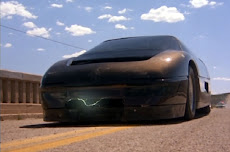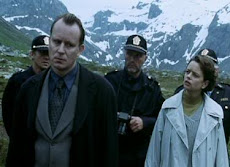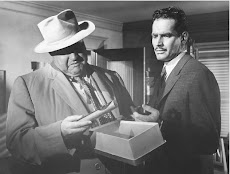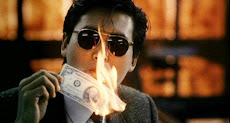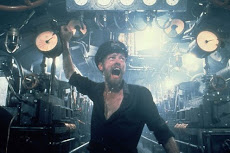"[S]tart a blog with your movie review [sic] so I don't have to deal with the bloated ad-filled Flixster application. This is half request/half demand."Rather than beginning with the obligatory introductory post, I will dive right into this latest blogging misadventure.
-A Better Man Than I.
Organizing a DVD collection can be a conundrum. Some organize by genre, others go by year, and some prefer no approach at all. I know it's cliche, but alphabetical works for me because, lo and behold, a specific movie is quite easy to find that way.
The other evening I was filing away stacks of movies brought out (some actually viewed) over the Christmas season, and decided to relegate a few poorly made purchases to the give-away stack at the bottom of the shelf. I'm not quick to give away many movies--The Wraith seems to always survive (note: I'm foreshadowing!)--but after I was through I noticed that two of the four movies I decided to discard were Body Double and Casualties of War, both directed by Brian De Palma.
Upon further investigation, I discovered that this will eliminate all traces of Mr. De Palma from my collection.
I have one prepared speech about De Palma, which encourages a late Hitchcock / early (more like mid) De Palma juxtaposition. Hitchcock is generally family-friendly. Okay, maybe he's not quite the first choice for your toddler, but his work is a far cry from what passes for a "murder mystery" these days. North by Northwest, Vertigo, Rear Window, etc. - great films that I'd let my kids watch (if I had any). There are only two exceptions to this rule: Psycho, of course, and Hitchcock's second-to-last film, Frenzy.

Frenzy is a side of Hitchcock I can do without; it's like grandpa getting drunk and reciting dirty limericks. While not without its Hitchcockian charms, the film features a graphic, disturbing depiction of rape and murder. This is not balanced, but made more disturbing, by an almost slapstick approach to the killer disposing of the body. Like all decades in which he worked, it appears Hitchcock read the 1970s all too well and gave us a taste of Grindhouse schlock with a budget. The ending is also canned and incredible, even by Hitchcockian standards.
Okay, enough trashing on Frenzy. The point is, it's a rightfully R-Rated film and, since Family Plot was undeniably a comedy, also the last formulaic Hitchcock film.
Enter Brian De Palma. Just one year after Frenzy, he released Sisters. Like Armageddon, to me this is one film that has no business in the Criterion Collection, but I digress. The Criterion release is very revealing in its ceaseless references to Hitchcock throughout the bonus features. If it had included a short introduction, "Hi, I'm Brian De Palma, and up until about 1984, I thought I was Alfred Hitchcock's illegitimate son," I would not have been surprised. So, De Palma / Hitchcock comparisons are not only inevitable, they're invited.
But where Hitchcock ended with a forgettable R-rated venture, De Palma immediately picked up with a string of R-rated homages. There's nothing wrong with experimentation, but there comes a point--for me the ripe old age of 25--where Hitchcock's timelessness continues its steady rise while De Palma's efforts become more and more stale. It's bad enough that Scarface adorns 50% of male college dormitories; I myself now wrestle with guilt over watching, pondering, and even recommending De Palma's Hitcock Homage Quadrilogy: Sisters, Dressed to Kill, Blowout, and Body Double.
Since I actually own it (but not for much longer), I will direct my focus to Body Double. Frenzy is perhaps the only Hitchcock film where the director actually utilized a body double, so the tie is immediately apparent.
Body Double is the story of a claustrophobic aspiring actor who, after making a clean break with his unfaithful girlfriend, lands a house-sitting gig to help out another aspiring actor. Aside from being a jewel of 80s architecture, the house features stunning views including the neighbor's bedroom, where a lonely housewife takes off her jewels stripper-style every evening before placing them in the safe. No good can come from this.
The parallels are obvious: Claustrophobia is not quite Vertigo, but Jimmy Stewart's not the only one with a Rear Window. The movie follows the formula to a tee: a wrongful accusation, and eventual vindication. But where Rear Window challenges the viewer to examine his or her voyeurism, Body Double invites only indulgence.
The story behind Body Double illustrates this point, for it was De Palma's last stand and triumph against the MPAA. Back in the early1980s the MPAA bestowed the dreaded "X" rating upon films it deemed too violent. Nowadays, directors seem more willing to make cuts--they'll just put them back in for the "Unrated" DVD release--but De Palma stood on principle (or something like it). Following a last-stand on Scarface that ended badly, De Palma followed the MPAA guidelines to the letter to produce graphic violence without actually crossing into X-rated territory.
And so...

...way to take a stand for the arts, Brian.
My criticism only snowballs from there: can one seriously consider a cameo performance by Frankie Goes to Hollywood a worthy homage or successor to Alfred Hitchcock? (Yes, the song is "Relax.")
Frenzy remains a conundrum, because the gratuity of Body Double is only a few steps ahead. Perhaps if Hitchcock had another 20 years in him, De Palma would have been a mere poser rather than keeper of the flame. But I don't think it matters, ultimately, for Hitchcock still had his masterpieces, and they would not be tarnished by his failures, any more than Frenzy tarnishes Rope.
If De Palma's Hitchcock phase is forgettable, it does not bode well for the rest of his career. Casualties of War is hardly Platoon (which is hardly Full Metal Jacket, which is hardly Hamburger Hill); The Untouchables does not live up to Miller's Crossing or other prohibition-era flicks. Redacted, The Black Dahlia, Femme Fatale, Mission to Mars, need I go on? Confronted with his recent duds, I'll take De Palma's Hitchcock Homage any day. But up against greatness, De Palma is doomed.


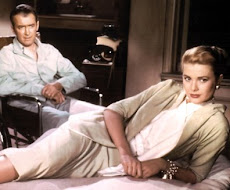_01.jpg)





